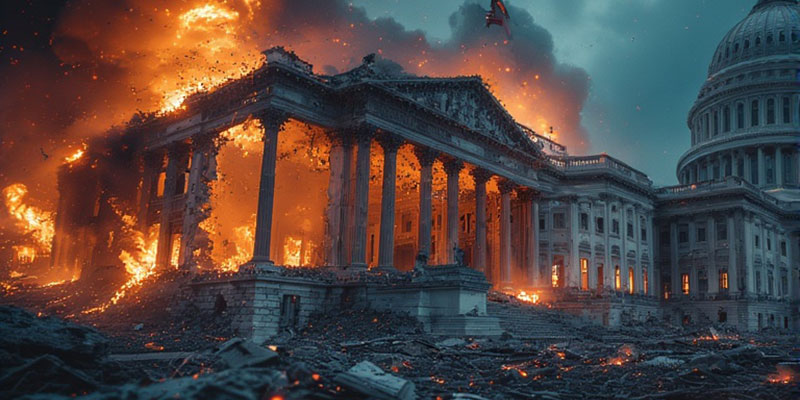In the murky amphitheater of the United States’ political carnival, wherein Washington and Wall Street conspire with all the clanking machinery of distraction, today’s top story unfurls as a particularly repellent act—an ostensible pause in humanitarian flights for wounded Gazans, orchestrated for maximum spectacle and minimum conscience.
The State Department, its rhetoric dripping with calculated cruelty, grunted that it would halt all visitor visas for Gazan individuals, invoking a “full and thorough review.” This step, taken just after a far‑right commentator—her lips encrusted with verbal diarrhea—screeched that allowing injured Palestinian children into the U.S. posed a “national security threat,” signals the system’s sadistic symbiosis with the most unhinged voices of power.
Meanwhile, across the globe in Israel, another pageant of ruin unfolds. Mass protests, powered by the steely resolve of hostage families and citizens wearied by 22 months of unspeakable suffering, have erupted in defiance of the government’s next military gambit. Roads smolder, bonfires bloom in city centers, and the nation—so quick to rally behind jingoism—cracks under the weight of grief and moral outrage.
Within Gaza, where the war’s human toll is impossible to quantify in mere numbers, the advance toward Gaza City continues at a catastrophic pace. The Gaza Health Ministry grimly reports tens of thousands of deaths, with malnutrition rising steadily, sealing the enclave in a vortex of desperation. This is not conflict—it is the slow genocide of a people rendered expendable for an ever‑more grotesque display of geopolitical theater.
And yet, amid this cacophony, the voices of ordinary people—refusing to be drowned—emerge with quiet dignity. Citizen‑activists and aid volunteers speak with polite, measured resolve; their words are humble arcs of clarity amid the shrieking chaos. A nurse calmly stated that true courage lies not in bombs but in care. A teacher politely requested empathy, reminding a broken audience that our shared humanity is not a slogan but a fragile bridge—one that demands tenderness, not cruelty.
In these moments of gentle clarity lies the very essence of balance and compassion. These are not hollow catchphrases; they are the subtle currents beneath a raging storm. They reflect a deeper understanding that no unilateral conquest—whether militarily in Gaza or rhetorically in Washington—can stand against collective integrity rooted in interconnectedness and humility.
As the spectacle unravels, the powerful—the policymakers, war‑hawks, corporate sponsors and their spokespeople—are revealed in all their unvarnished gore: grotesque gluttony displayed as strategy, propaganda masquerading as governance. They blubber and bellow, rallying profit and distraction as their only creed. Their narratives drift like toxic smoke, designed to suffocate empathy and blind public conscience.
The path forward cannot be found within the machinery of reform. Tinkering at the margins, or imposing yet another digestion of piecemeal compromise, only fattens the beast. Instead, we stand at a pivotal moment calling for fundamental change—a transformation not framed by slogans or power brokers, but born from a radical shift within each individual’s awareness.
This shift calls for shedding allegiance to spectacle, to the manufactured narratives that feed fear and numbness. It demands awakening to the clarity of the heart, the quiet recognition that freedom and justice cannot be given—they must arise spontaneously where integrity meets compassion.
In this space of attention—free from idols, free from inherited ideologies—we learn what it means to act without agenda, without craving approval or reward. And here, at the heart of collective integrity, we discover the possibility of true governance, of a society composed not of gladiators and profiteers, but stewards of life’s fragile interdependence. Here lies the seed of transformation, waiting to be nurtured by ordinary people of uncommon clarity.
Footnotes
- The Gaza Health Ministry reports ongoing staggering casualties and malnutrition amid intensifying attacks.
- The U.S. State Department announced a suspension of all visitor visas for Gaza residents, citing procedural review, following criticism from far‑right commentator Laura Loomer.
- In Israel, mass protests erupted demanding a deal to free hostages and an end to military operations in Gaza.
